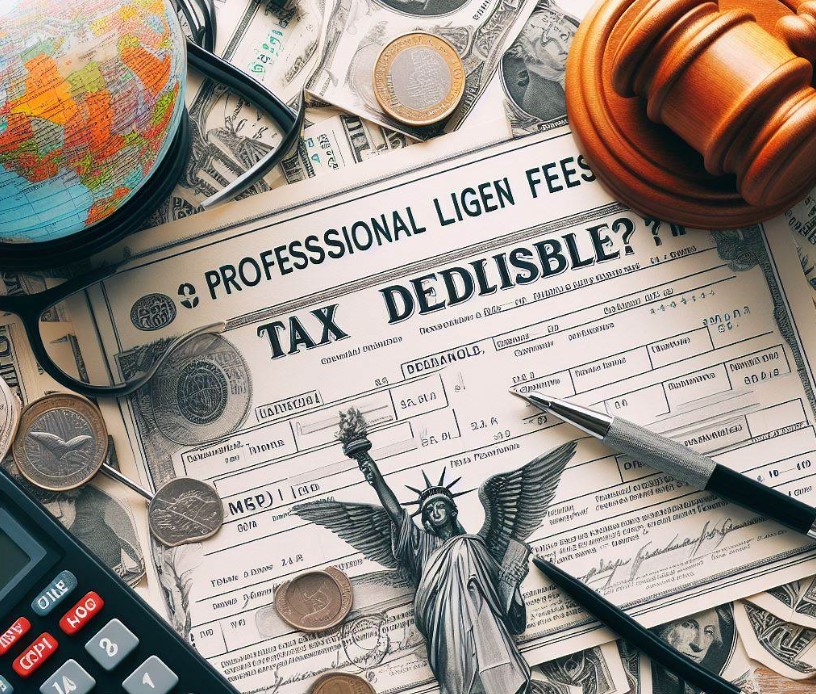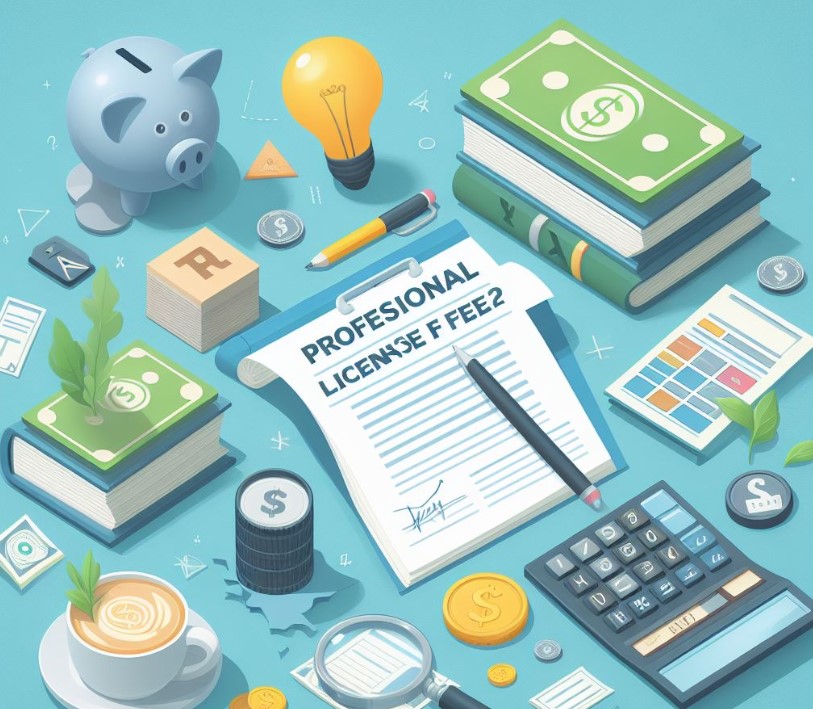In this article, we’ll explain Are Professional License Fees Tax Deductible? Determining whether professional license fees are tax deductible is a crucial concern for many professionals. This article explores the nuances of tax deductions related to professional licenses. Understanding these aspects can significantly impact financial planning and tax liability for professionals across various fields.
Key Takeaways
- Professional license fees can often be tax deductible depending on the circumstances.
- Deductibility varies based on the nature of the profession and the tax laws in the specific jurisdiction.
- Documentation and compliance with tax regulations are essential for claiming deductions.
- The impact of the Tax Cuts and Jobs Act on deductions for professional license fees.
- Consulting with a tax professional is advisable for personalized advice.
Are Professional License Fees Tax Deductible?
Professional license fees are often tax deductible. The deductibility largely depends on whether these fees are considered necessary and ordinary expenses for your profession.
Generally, if the license is a requirement to perform your job legally, the fees are likely deductible. This deduction can be claimed under unreimbursed employee expenses or business expenses, depending on your employment status.

Criteria for Deductibility
To qualify for a tax deduction, professional license fees must meet certain criteria:
- Necessity and Ordinariness: The license should be a common and accepted expense in your field.
- Legal Requirement: The license must be legally required for practicing your profession.
- Non-Reimbursement: The expense should not be reimbursed by your employer.
Impact of Employment Status
Your employment status plays a crucial role in how you can deduct these fees:
- Self-Employed Professionals: Can deduct license fees as a business expense.
- Employees: Deductions depend on the tax laws and may be limited.
Tax Cuts and Jobs Act and License Fee Deductions
The Tax Cuts and Jobs Act (TCJA) of 2017 brought significant changes to tax deductions. For employees, the Act eliminated the ability to deduct unreimbursed work-related expenses, including professional license fees. However, self-employed individuals and business owners still benefit from these deductions.
Post-TCJA Scenario for Employees
- Loss of miscellaneous itemized deductions for employees.
- Increased standard deduction may offset the loss for some taxpayers.
Continuing Benefits for Self-Employed Professionals
- Deductions for business expenses, including license fees, remain intact.
- Critical for self-employed individuals to maintain thorough records of such expenses.
Documentation and Compliance
Proper documentation and compliance with tax regulations are paramount when claiming deductions for professional license fees.

Importance of Record Keeping
- Retain receipts, invoices, and proof of payment for all license-related expenses.
- Documentation is crucial in the case of IRS audits.
Compliance with Tax Laws
- Understand the specific tax regulations applicable to your profession.
- Consulting with a tax professional can ensure compliance and optimize deductions.
Specific Professions and License Deductibility
The deductibility of professional license fees can vary significantly across different professions.
Healthcare Professionals
- License fees for doctors, nurses, and other healthcare professionals are typically deductible.
- Essential for maintaining legal practice status.
Legal and Accounting Professions
- Bar association dues and CPA license renewals are often deductible.
- Considered necessary expenses for practicing law or accounting.
Tax Planning Strategies for License Fees
Strategically planning for tax deductions on professional license fees can yield significant benefits. Understanding how to effectively incorporate these deductions into broader financial planning is essential for professionals.
Maximizing Deductions
- Timing of Payments: Paying your license fees in a year when you have higher income can maximize deductions.
- Bundling Expenses: Combining license fees with other deductible expenses may help in surpassing the standard deduction threshold.
Long-Term Planning
- Forecasting Income: Anticipate changes in income to determine the best years for claiming deductions.
- Retirement Considerations: Factor in license fee deductions in retirement planning, especially for professionals who continue to work part-time.
State Tax Implications
State tax laws can have a significant impact on the deductibility of professional license fees. The rules can vary greatly from one state to another, affecting how these deductions are treated.

State-Specific Deduction Rules
- Some states allow deductions for professional license fees even if they are not deductible at the federal level.
- The deductibility can depend on the state’s conformity with federal tax laws.
Understanding Your State’s Tax Code
- Researching your state’s tax regulations is crucial.
- Consulting with a local tax professional can provide clarity on state-specific deductions.
Alternative Deduction Options
When professional license fees are not deductible, exploring alternative options can be beneficial. Understanding other potential deductions related to your profession can offset the non-deductibility of license fees.
Continuing Education and Training
- Expenses for professional development and continuing education may be deductible.
- These can include seminars, workshops, and relevant courses.
Home Office and Other Expenses
- Home office expenses can be deductible for self-employed professionals.
- Other expenses like professional insurance and association dues might also offer tax benefits.
Impact on Different Business Structures
The impact of professional license fees deductions can vary based on the business structure of your practice. Whether you operate as a sole proprietor, partnership, or corporation influences your deduction strategies.

Sole Proprietorships and Partnerships
- Easier to claim deductions for license fees as business expenses.
- Deductions can reduce self-employment tax liabilities.
Corporations
- C-Corporations can deduct license fees as business expenses.
- S-Corporations must navigate more complex rules regarding expense deductions.
International Professionals in the U.S.
International professionals working in the U.S. face unique challenges regarding the deductibility of professional license fees. Navigating these complexities requires an understanding of both U.S. tax laws and potential implications in their home countries.
Non-Resident and Resident Tax Status
- Tax treatment for non-resident and resident aliens differs significantly.
- Understanding your tax status is crucial for determining deductibility.
International Tax Treaties
- Some countries have tax treaties with the U.S. that can affect deductions.
- Consulting with a tax professional knowledgeable in international tax law is advisable.
Conclusion
Understanding the tax deductibility of professional license fees is essential for financial planning. While these fees are often deductible, the specifics depend on various factors like employment status and the nature of the profession. With the introduction of the TCJA, the landscape of tax deductions has shifted, particularly for employees.
Maintaining accurate records and seeking professional tax advice are critical steps in navigating this complex area. The importance of being well-informed and compliant with tax laws cannot be overstated for professionals looking to optimize their financial outcomes.
People Also Ask
Can new license fees for starting a profession be deducted?
Initial license fees for starting a profession may not be deductible as they are often considered capital expenses. However, the rules can vary, and it’s recommended to consult a tax professional for specific advice.
Yes, continuing education expenses required to maintain a professional license are generally deductible. These expenses can be claimed as business expenses for self-employed individuals or, in some cases, as itemized deductions.
If I am self-employed, how do I deduct professional license fees?
If you are self-employed, you can deduct professional license fees as a business expense on Schedule C of your tax return. These expenses should be ordinary and necessary for your business.
Can I deduct license fees if I am an employee of a company?
Post the Tax Cuts and Jobs Act, most employees cannot deduct professional license fees on their federal tax returns as these are considered unreimbursed employee expenses. However, some states might still allow such deductions.

Muhammad Talha Naeem is a seasoned finance professional with a wealth of practical experience in various niches of the financial world. With a career spanning over a decade, Talha has consistently demonstrated his expertise in navigating the complexities of finance, making him a trusted and reliable figure in the industry.









